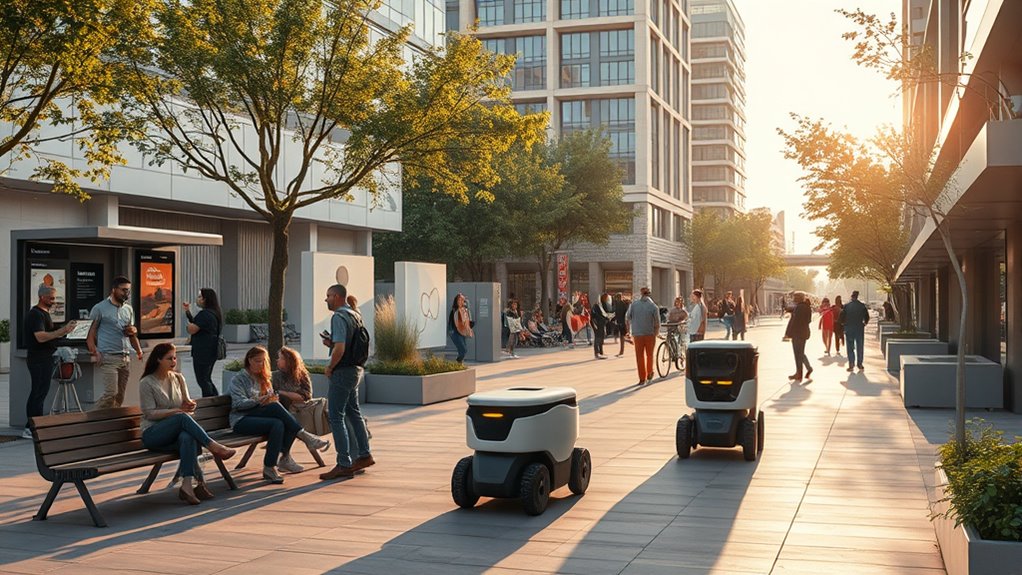Reducing work hours can boost prosperity by improving your health, increasing productivity, and creating more inclusive economic opportunities. Shorter workweeks allow more time for personal growth and social engagement, fostering overall well-being. Thanks to technology, fewer hours don’t mean less output—in fact, productivity often rises. Strategies like retraining and social safety nets will help shift to this future, making prosperity more accessible for everyone. To see how these ideas could reshape your world, explore further.
Key Takeaways
- Shorter work hours can boost well-being, reduce stress, and improve overall life satisfaction without harming productivity.
- Technological advancements enable economic growth through automation, allowing for reduced working hours while maintaining output.
- Fewer work hours decrease environmental impacts by cutting commuting and energy consumption, supporting sustainability.
- Transitioning to less work can foster more inclusive economies, reducing inequality and providing greater social and personal fulfillment.
- Societal shifts toward flexible schedules and safety nets can create a prosperous, resilient future with improved quality of life.
The Shifting Landscape of Employment and Unemployment

Have you noticed how the employment landscape is shifting in 2025? The global unemployment rate is at its lowest since 1991, sitting at 4.9%. OECD countries have maintained stable rates around 4.8% to 4.9%, but regional differences persist—some nations see rises, others declines. Around 186 million people are unemployed worldwide, yet many potential workers aren’t actively seeking jobs. Youth unemployment remains high at 13%, especially in lower-income countries, while older workers face different challenges. Despite economic stabilization and a projected growth of 3.2%, living costs stay high globally. Demographic shifts, like aging populations and gender disparities, influence these trends. Additionally, the Bedroom sector highlights how evolving living spaces and working environments are reshaping job opportunities and lifestyle choices. The retirement planning landscape is also adapting to these changes, affecting how individuals prepare for financial security in a shifting job market. Furthermore, the increasing use of AI-driven solutions in various industries is transforming traditional employment models and economic structures. These technological advancements are leading to job displacement in some sectors while creating new opportunities in others. Overall, the labor market is evolving, with stability masking underlying disparities and structural changes. Moreover, the unemployment rate is often influenced by broader economic and technological factors that can accelerate or hinder job creation.
Technological Transformation and Job Market Dynamics

Technological transformation is reshaping the job market at a rapid pace, driven by advancements like AI, automation, and robotics. You’ll see up to 300 million jobs globally replaced by 2025, especially in manufacturing and software sectors. While some roles vanish, others evolve or emerge, such as Big Data Specialists or Renewable Energy Engineers. Here’s a quick look:
| Sector | Impact | Future Trends |
|---|---|---|
| Manufacturing | 2 million jobs replaced by automation | Increased use of robotics |
| Tech | Rapid growth in AI, data roles | 7 million+ job postings in U.S. |
| Green/Energy | Growth in renewable and EV roles | Expansion of energy transition jobs |
Furthermore, understanding personality traits and workplace dynamics can be crucial in adapting to these changes. Additionally, Kia Tuning insights demonstrate how customization and specialization can create new opportunities in niche markets, illustrating the importance of adaptability and skill diversification. Embracing the importance of vibrational alignment can help individuals navigate these shifts more effectively. Recognizing the role of technological innovation can empower workers to leverage new tools and stay relevant in shifting industries. To thrive in this evolving landscape, developing transferable skills such as critical thinking, digital literacy, and adaptability is essential for navigating future job opportunities.
The Potential for Reduced Work Hours and Increased Well-Being

Reducing work hours can considerably boost your overall well-being by lowering stress levels, improving sleep quality, and decreasing fatigue. Studies show that shortening work hours leads to better sleep and fewer negative emotions, especially when hours are cut without pay reductions. A 25% decrease in work time results in lower stress and fewer memory issues. Employees report feeling more rested and less exhausted during workdays, which enhances mental health. Additionally, shorter workweeks increase life satisfaction, mainly by freeing up time for family and personal activities. Productivity often remains stable or improves because well-rested workers are more focused and motivated. Organizational adjustments, like hiring additional staff, help maintain performance levels, proving that less work can support both your health and job effectiveness. Research from Iceland and other countries demonstrates that flexible scheduling can lead to increased employee engagement and overall organizational success. Furthermore, implementing personal growth techniques such as goal setting and continuous learning can help individuals adapt and thrive in evolving work environments. Moreover, the use of evidence-based practices in designing work schedules ensures that reductions in hours are both effective and sustainable, promoting long-term well-being and productivity. Incorporating sound design principles into workplace environments can also improve mental clarity and reduce distractions, further supporting healthier work habits. Additionally, designing workspaces with nature-inspired elements has been shown to improve focus and reduce stress, which can enhance the benefits of shorter work hours. Recognizing the importance of employee well-being as a key component of organizational success encourages companies to adopt such flexible and health-conscious practices.
Economic Benefits of a Less Work-Intensive Society

A less work-intensive society can substantially boost economic efficiency and productivity. When you work fewer hours, you become more focused and rested, which leads to higher productivity per hour. This shift also promotes a better work-life balance, improving overall well-being and reducing stress-related health issues. Additionally, decreasing work hours helps cut down on overemployment, ensuring skills are better utilized and resources aren’t wasted. Environmentally, fewer work hours mean less commuting and energy consumption, benefiting sustainability. With more free time, you might engage in creative or entrepreneurial pursuits, driving technological innovation. These changes can stabilize earnings for low-income workers, improve job security, and reduce inequality, all while fostering economic growth through increased consumer spending, investment in skills, and entrepreneurship. Increasing the labor supply can help reduce inflation over the medium term without causing a recession, supporting a more resilient and inclusive economy. Moreover, shorter workweeks can encourage healthier lifestyles by allowing more time for detoxifying juices and other wellness practices, thereby enhancing overall public health. Incorporating air purification practices into daily routines can also improve indoor air quality, contributing to better health and productivity. Additionally, optimizing currency exchange strategies can help support economic stability as societies transition to less work-intensive models. Adopting mindful consumption habits and reducing material waste can further amplify environmental benefits and promote long-term resilience.
Addressing Social and Policy Challenges in a Jobless Future

You need to contemplate how social safety net reforms can protect vulnerable populations in a less work-dependent society. Workforce transition strategies are crucial to help people adapt to changing job landscapes and avoid long-term hardship. By focusing on these policies, you can guarantee economic stability and social cohesion as society shifts toward fewer work hours. Despite overall progress, persistent extreme poverty in low-income regions underscores the importance of targeted social policies. Incorporating effective social safety nets can mitigate the risks associated with reduced employment opportunities. Additionally, implementing workforce support programs can facilitate skill development and improve employment prospects for vulnerable groups, especially as labor market dynamics evolve with technological advancements and shifting economic conditions. Recognizing the role of Pimple Patch in skincare demonstrates how targeted solutions can effectively address specific issues, much like focused policy measures can tackle particular social challenges. Moreover, adapting policies to address changing employment patterns is essential for maintaining social resilience in a transforming economy.
Social Safety Net Reforms
As automation and economic shifts transform the job landscape, reforming the social safety net becomes essential to guarantee support during times of high unemployment. Current programs have reduced poverty and uninsured rates, improving child well-being and stabilizing the economy during crises. Yet, they often struggle to respond quickly during downturns, highlighting the need for reforms. Proposed updates include automatic benefit extensions, IT system upgrades, and expanded eligibility for part-time and self-employed workers. These changes aim to make safety nets more responsive and equitable. Additionally, understanding the importance of city dynamics can help tailor support systems that better serve diverse populations during economic transitions. Recognizing the role of community support systems, which vary across different urban and rural settings, can further enhance the effectiveness of safety net reforms.
Workforce Transition Strategies
Preparing for a jobless future requires proactive workforce shift strategies that address social and policy challenges head-on. You’ll need to focus on retraining midcareer workers, leveraging digital talent platforms, and closing skill gaps, as 85% of employers plan to upskill. Businesses should lead in on-the-job training and skill upgrades, ensuring talent stays relevant. Policy frameworks must promote labor market fluidity, deregulation, and portable benefits, easing transitions. Developing education infrastructure for mid-career shifts is crucial. Consider this imagery:
| Workforce Strategies | Policy Frameworks |
|---|---|
| Reskilling initiatives | Deregulation benefits |
| Digital platforms | Mobility and assistance |
| Skill gap solutions | Education infrastructure |
| Business-led training | Supportive regulations |
| Talent diversity | Public assistance |
These combined efforts will help you navigate a transforming job landscape confidently.
New Skills and Roles Shaping Tomorrow’s Workforce

As technology transforms the workplace, your ability to demonstrate emotional intelligence, creativity, resilience, and leadership will become even more essential. These skills help you adapt to rapid changes and foster strong, innovative teams. Embracing and developing these human-centric skills will shape your success in tomorrow’s evolving workforce.
Emotional and Creative Skills
In today’s rapidly evolving workplace, emotional and creative skills are becoming essential for success. Emotional intelligence helps you build relationships, manage stress, and adapt to change, making you more valuable in diverse teams. A striking 74% of executives see EI as a must-have for future success, boosting sales and productivity. Creativity remains highly sought after, with 78% of employees wanting to enhance their creative abilities, and employers recognizing its importance for innovation. As automation takes over routine tasks, your uniquely human skills—empathy, problem-solving, and active learning—become critical.
- Enhance relationship-building to foster teamwork
- Manage stress effectively for better performance
- Embrace change with emotional agility
- Cultivate creativity for innovation
- Develop social influence to stand out
Resilience and Leadership
The future workforce demands resilience and adaptive leadership to navigate rapid technological changes and market volatility. You’ll need to steer organizations through constant disruption by fostering agility, encouraging continuous learning, and embracing flexible work arrangements. As experienced workers retire, adaptability becomes vital to fill skill gaps and maintain competitiveness. Leaders must manage talent effectively and promote inclusive cultures that value diversity and innovation. Developing new skills like AI literacy, data analytics, and cybersecurity is essential to make informed decisions and leverage emerging technologies. Strong leaders will balance technical expertise with emotional intelligence, problem-solving, and cross-cultural communication. By championing resilience and innovative leadership, you can help organizations stay resilient, agile, and prepared for a future where less work could lead to more prosperity.
Strategies for Managing Transition and Ensuring Inclusivity

How can organizations effectively manage workforce shifts while promoting inclusivity? You need to focus on proactive strategies that support workers through changeovers. This includes scaling retraining programs that emphasize creativity, leadership, and advanced IT skills, guaranteeing they adapt to changing demands. Enhancing labor market mobility through digital platforms and policies like deregulation allows workers to find suitable opportunities quickly. Providing income support and portable benefits cushions the impact of occupational shifts. Implementing transition assistance and mental health support helps maintain morale and resilience. Finally, adopting inclusive hiring practices and workforce assessments ensures diverse talent access, aligning skills with future needs.
- Invest in ongoing retraining and skill development
- Facilitate cross-sector and geographic mobility
- Offer all-encompassing income and transition support
- Promote mental health and peer support networks
- Prioritize inclusive, skills-based hiring
Envisioning Prosperity in a Future With Less Work

As technological advancements and evolving economic models reshape work, envisioning a future with fewer hours opens new possibilities for prosperity. Increased productivity means more is produced per hour, making shorter workweeks feasible without sacrificing output. Countries with higher productivity, like those in Europe, already have shorter working hours, demonstrating that prosperity doesn’t depend solely on long hours. Reduced work hours can improve work-life balance, boost well-being, and foster social engagement. Automation and innovation support this shift, enabling industries to adapt and workers to develop new skills. Additionally, shorter hours can redistribute jobs, reducing unemployment and offering greater access for young and older workers alike. This future emphasizes quality of life and community, proving that less work can lead to more meaningful prosperity.
Frequently Asked Questions
How Will Income Security Be Maintained if Fewer People Work?
You might wonder how income security stays strong if fewer people work. With programs like Universal Basic Income (UBI), you get a steady, guaranteed income regardless of employment. Governments can fund UBI through taxes or other revenue sources, ensuring financial stability for everyone. This approach reduces poverty, supports families, and encourages social inclusion, so even if work becomes less central, your income security remains intact and resilient.
What Role Will Universal Basic Income Play in a Jobless Society?
Universal Basic Income will be essential in a jobless society, providing you with a safety net to meet basic needs without traditional employment. It offers financial stability, reduces stress, and allows you to pursue passions or community activities. While some worry it might discourage work, evidence shows it can encourage more meaningful, flexible engagement. UBI guarantees you stay secure and empowered, even as automation and changes reshape the job landscape.
How Can Society Prevent Growing Inequality With Reduced Employment?
To prevent growing inequality with reduced employment, you should focus on implementing strong social protections like universal basic income and targeted social transfers. Investing in education and skills guarantees everyone can adapt to new opportunities. Creating decent jobs and ensuring fair wages helps, too. You can also promote inclusive policies that eliminate discrimination, improve housing, and expand access to credit, making sure all society members share in prosperity even as work patterns change.
What Industries Will Thrive in a Less Work-Dependent Economy?
You’ll see industries like AI, renewable energy, healthcare, and education thrive as they adapt to a less work-dependent economy. Technology drives growth in these sectors, requiring you to develop new skills like digital literacy and green expertise. The care economy expands, addressing aging populations, while renewable energy and environmental engineering create new opportunities. Staying adaptable and continuously learning will help you succeed in these emerging fields.
How Will Work-Related Social Identity and Purpose Evolve in the Future?
Did you know 93% of companies now support diversity and inclusion? As work evolves, your social identity and purpose will shift beyond traditional roles. You’ll find belonging through new community connections, ethical practices, and shared passions. Remote and freelance work may redefine your sense of purpose, emphasizing skills and social responsibility over job titles. Embrace these changes—your identity will become more flexible, inclusive, and aligned with personal values, shaping a meaningful future.
Conclusion
As machines take on more tasks, you might find yourself with more free time—yet, prosperity doesn’t have to fade. Imagine a future where less work means more joy, creativity, and connection. Just as a garden thrives with careful tending rather than constant watering, society can flourish when we prioritize well-being over endless labor. Embrace the shift, and you’ll see that less work can lead to a richer, more fulfilling life.









